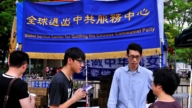【新唐人2011年11月30日讯】继发布“限娱令”后,中共广电总局再祭出“限广令”。自2012年元旦起,全面禁止电视台在播放电视剧时插播广告。许多专家怀疑它的合理性和效果。
中共广电总局对媒体实施的最新限制,要求全国所有电视台从2012年开始,全天播出的电视剧时段,一律禁止插播广告。
中国艺术研究院学者吴祚来:“他们这样一个行为,是不合国际惯例是吧,插播广告适度就可以,如果太泛滥了,大家也是受不了,所以这个他不能用行政的方式,他应该有一些公开征求业界的意见,然后再做出一些调整,他不能动不动就做出一个什么规定,不允许娱乐节目超过多少时间,或者不允许插播广告,这些都是没有道理的。”
而大陆文化评论学者叶匡政认为,这种禁令对于电视产业来说,是“上有政策下有对策”,电视台为了经济利益,可能变个新花样刊广告,也可能为了植入广告而修改电视剧本内容。
大陆文化评论学者叶匡政:“我认为无论是限娱令还是限广令,都应该说是比较荒唐的,那么如果通过禁止的话,他会导致电视剧本身这种产品出现变质,比如说,他可以通过大量的植入广告来完成这个(收入),就使得电视剧脱离艺术这种方式可能越来越远,比如讲,为了某个车子的广告,明明故事情节不需要出现那样的车,他会出现一辆车。”
“限广令”对电视台和广告商影响最大的就是广告收入减少。叶匡政认为,这个禁广令不排除是个保护令,也就是保护央视一家独大的利益。
大陆文化评论学者叶匡政:“我个人认为可能是为了保护中央电视台的利益,用这个解释才能合理,因为各地很多电视剧,因为各个地方的电视台、地方卫视这种电视剧,他能播的电视剧相对来说,要比央视的尺度要宽一点,也就是说,他对民众的吸引力,或者是说观众可能更喜欢看,那么这就导致了可能很多大的广告商、或者是广告客户,开始把更多的广告费用投入在这种能够吸引观众的地方电视台。”
有媒体报导,电视剧所获得的广告收入,占据了电视台收入的2/3左右,禁广令的出台必定会对电视台营收产生一定影响。
中国艺术研究院学者吴祚来:“他们这个行政权力,它不受任何制约,一家产业独大,所以他就可以想怎么规定就怎么规定,大的电视台就可以依靠他们的行政力量,来打压地方电视台,使地方电视的广告慢慢的流向中央电视台。”
大陆文化评论学者叶匡政:“这些垄断的利益集团,透过这种方式,让广电总局做了这种禁令,我觉得这种可能性更大,他其实是为了某个利益集团在代言,这个利益集团可能就是中央电视台,目前出现了很多禁令,还是属于体制内部的各个利益集团之间的争夺吧。”
中共当局在近几个月进行一连串所谓的文化清理整顿行动,目的是为了加强对电视和喜欢发表意见的互联网文化的控制。学者担心,禁广令一旦实施,未来观众看到的电视剧,可能全部都是“广告商品展示剧或推销剧”,这样反而使广告无所不在。
新唐人记者秦雪、黄容、薛莉采访报导
SARFT Limits Chinese TV Ads
China’s State Administration of Radio Film and Television
(SARFT) issued the Advertisement Limit Order after issuing the Entertainment Limit Order.
Effective Jan. 1, 2012, all Chinese TV stations are forbidden
to add any paid advertisements during their respective TV series.
Many experts doubt the legitimacy and effectiveness
of these orders.
Effective Jan. 1, 2012, SARFT ordered all TV stations in China
not to add any advertisements during their respective TV series.
Wu Zuolai, a scholar from the Chinese Academy of Arts:
“SARFT’s actions are incompatible with international practices.
Inserting an appropriate number of advertisements is fine,
but if there are too many, audiences won’t be able to take it.
The SARFT shouldn’t use its administrative power
to control people.
The SARFT should openly seek the industry’s opinions
and then make some adjustments.
Now, SARFT issues orders with impunity and freely limits
the length of the different TV programs, not allowing ads. This is ridiculous.”
Ye Kuangzheng, a China cultural commentator, thought that
local TV stations will find a solution to deal with the ban.
Facing the pressure of turning a profit, TV stations may resort
to using other means to insert ads, and may even change the TV series’ script and insert ads this way.
Ye Kuangzheng, a China cultural commentator: “I think both
the Entertainment Limit Order and the Advertisement Limit Order are ridiculous.
This kind of ban will wind up changing the TV series itself.
They can add a lot of ads to any given TV series to make money,
but this will wind up commercializing the TV series.
For example, a particular story doesn’t call for a car, but there’s
a car ad so the TV station changes the script to show a car.”
The main effect of the Advertisement Limit Order is
to decrease a TV station’s ad income.
Ye Kuangzheng thought that this order was issued to protect
China Central Television (CCTV), the sole beneficiary.
Ye Kuangzheng, a China cultural commentator: “I think
SARFT wants to protect the CCTV, which is a rather reasonable explanation.
China has many TV stations that play many different types of
TV series.
Compared with the CCTV programming, the local TV series’
content offers more diversity, which means it will attract more viewers.
This causes many ad clients to spend more of their ad budget
with local channels.”
Some media report that their ad income is about 66%
of a TV station’s total income.
There’s no doubt that the Advertisement Limit Order
will impact every TV station’s bottom-line.
Wu Zuolai, a scholar from the Chinese Academy of Arts:
“This kind of administrative power has no constraint.
It’s like one person can control everything and
can make any kind of rules based on his own needs.
Bigger TV stations can use their administrative power
to suppress local TV stations, and then ads will gradually flow to the CCTV.
Ye Kuangzheng, a China cultural commentator: “It’s very
possible that these monopolized profitable groups asked the SARFT to issue the ban using its administrative power.
In fact, SARFT is a representative of some highly profitable
group, and this group is most probably the CCTV.
Now, there are many bans that have come along whose sole aim
is for one group to profit at another group’s expense.”
The Chinese Communist Party (CCP) implemented a series
of so-called “cleaning actions” to gain control over TV stations and the Internet.
Scholars worry that audiences will see “ad shows” than real
TV series once the Advertisement Limit Order is implemented.
At that time, they’ll be commercials in all types of the
TV shows everywhere.
NTD Reporters: Qin Xue, Huang Rong and Xue Li






























